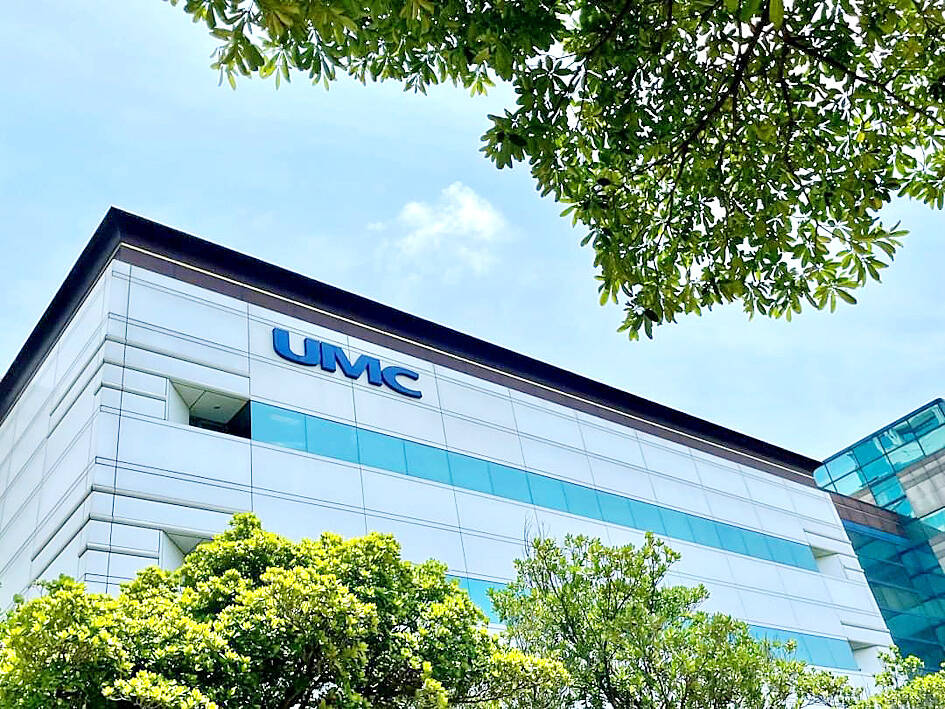United Microelectronics Corp (UMC, 聯電) expects revenue to remain stable this quarter amid slightly better-than-expected demand for its computer segment, bucking the usual seasonal downturn during the final quarter of the year, the company told an online investor conference on Wednesday.
That was based on UMC’s expectations that wafer shipments would remain flat this quarter. In addition, the average sales price would be unchanged this quarter, which it attributed to its optimized and differentiated technology offerings.
UMC’s revenue last quarter rose to NT$60.49 billion (US$1.89 billion), the strongest level in about seven quarters. Communication chips were the biggest revenue source, accounting for 42 percent of the chipmaker’s total sales last quarter. Consumer chips came next with a 31 percent share, while computer chips only made up 13 percent.

Photo: Grace Hung, Taipei Times
“With regards to the fourth-quarter outlook, we are seeing demand stabilizing across the end market and a clear downward trend in inventory levels,” UMC co-president Jason Wang (王石) said.
“For the fourth quarter, we expect the trend in the computing segment would be slightly better quarter-on-quarter than we originally expected. However, that would be offset by a mild decline in the communication and consumer segments,” Wang said.
Gross margin is to drop to about 30 percent this quarter, which would be the lowest in one-and-a-half years, down from 33.8 percent last quarter. UMC attributed the decline to higher depreciation costs on facilities and manufacturing equipment.
Depreciation costs are to swell 20 percent year-on-year this year, and the uptrend would extend into next year, UMC said.
When the depreciation costs start to wane and drop to the normal range after next year, the gross margin would rebound to 40 percent, Wang said.
UMC aims to keep its margin of earnings before interest, taxes, depreciation and amortization stable at about 42 or 43 percent, he said.
Lower equipment utilization is also a factor weighing down gross margin, which is to slide to 66 to 68 percent this quarter from 71 percent last quarter, due to a larger capacity base.
UMC on Wednesday trimmed its estimated capital spending for this year to US$3 billion from an earlier estimate of US$3.3 billion.
UMC said that its partnership with Intel Corp on developing 12-nanometer technology remains on track. The first 12-nanometer chip is to come out in 2026, the chipmaker said.
As for its progress in offering silicon interposers that are used in the older version of advanced chip-on-wafer-on-substrate packaging technology, Wang said UMC has doubled its interposer capacity to 6,000 wafers a month.
UMC has engaged with multiple customers to supply interposers next year and is in discussions with customers to increase supply, he said.
The company on Wednesday posted its best quarterly net profit since last year at NT$14.47 billion, up 5 percent sequentially from NT$13.79 billion. On an annual basis, net profit contracted 9.4 percent from NT$15.97 billion.
The revenue contribution from its 22-nanometer and 28-nanometer technology rose to 35 percent from 33 percent in the prior quarter.

Real estate agent and property developer JSL Construction & Development Co (愛山林) led the average compensation rankings among companies listed on the Taiwan Stock Exchange (TWSE) last year, while contract chipmaker Taiwan Semiconductor Manufacturing Co (TSMC, 台積電) finished 14th. JSL Construction paid its employees total average compensation of NT$4.78 million (US$159,701), down 13.5 percent from a year earlier, but still ahead of the most profitable listed tech giants, including TSMC, TWSE data showed. Last year, the average compensation (which includes salary, overtime, bonuses and allowances) paid by TSMC rose 21.6 percent to reach about NT$3.33 million, lifting its ranking by 10 notches

Popular vape brands such as Geek Bar might get more expensive in the US — if you can find them at all. Shipments of vapes from China to the US ground to a near halt last month from a year ago, official data showed, hit by US President Donald Trump’s tariffs and a crackdown on unauthorized e-cigarettes in the world’s biggest market for smoking alternatives. That includes Geek Bar, a brand of flavored vapes that is not authorized to sell in the US, but which had been widely available due to porous import controls. One retailer, who asked not to be named, because

SEASONAL WEAKNESS: The combined revenue of the top 10 foundries fell 5.4%, but rush orders and China’s subsidies partially offset slowing demand Taiwan Semiconductor Manufacturing Co (TSMC, 台積電) further solidified its dominance in the global wafer foundry business in the first quarter of this year, remaining far ahead of its closest rival, Samsung Electronics Co, TrendForce Corp (集邦科技) said yesterday. TSMC posted US$25.52 billion in sales in the January-to-March period, down 5 percent from the previous quarter, but its market share rose from 67.1 percent the previous quarter to 67.6 percent, TrendForce said in a report. While smartphone-related wafer shipments declined in the first quarter due to seasonal factors, solid demand for artificial intelligence (AI) and high-performance computing (HPC) devices and urgent TV-related orders

MINERAL DIPLOMACY: The Chinese commerce ministry said it approved applications for the export of rare earths in a move that could help ease US-China trade tensions Chinese Vice Premier He Lifeng (何立峰) is today to meet a US delegation for talks in the UK, Beijing announced on Saturday amid a fragile truce in the trade dispute between the two powers. He is to visit the UK from yesterday to Friday at the invitation of the British government, the Chinese Ministry of Foreign Affairs said in a statement. He and US representatives are to cochair the first meeting of the US-China economic and trade consultation mechanism, it said. US President Donald Trump on Friday announced that a new round of trade talks with China would start in London beginning today,